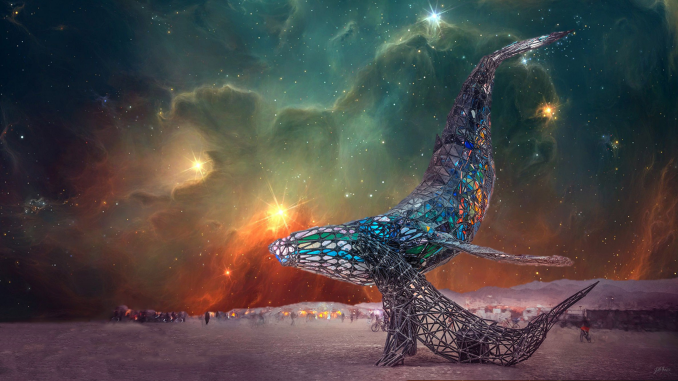
Burning Man takes place in August out in the Black Rock Desert of Nevada. There, it is baking hot during the day and bitingly cold at night. Raging dust storms and furious white outs. Gale force winds. Soil so parched and alkaline that nothing grows in it – not even microbes. High elevation, lower oxygen levels, and humidity so low that if you weren’t hydrating all the time you’d shrivel up like a dried raisin and be dead before the day is done.
On one occasion, at the peak of the blistering heat and unforgiving wind, in the midst of a whiteout dust storm, my friend Kevin (a.k.a. Eskimo) turned to me and said, “People have come to hell and created heaven.”
That thought has resonated with me ever since. I find myself thinking about it often and I realise that Burning Man is, indeed, my heaven. It’s a heterotopia — an example of the adjacent possible. I daresay, it’s the closest thing we’ve got to Utopia (literally, both “good place” and “no place”.)
The conventional notion of heaven is a physical place. A transcendental location outside of spacetime. However, the Buddhist conception of heaven is quite different. In many Eastern philosophies, heaven is not a place but a state of mind.
The everyday default state of mind is described as samsara (characterised by self-consciousness, the supremacy of the ego, anxiety about life, fear of death, and all the negative emotions of being).
On the other pole is nirvana – probably the closest idea to heaven you’d get in the Buddhist tradition. It is simply a state of mind or a way of life based on the realisation of the impermanence of life and a lack of independent existence. According to the famous monk Dogen, founder of the Soto school of Zen, when we are truly in nirvana, we awaken to the fact that nirvana and samsara are not two separate things. In Mahayana Buddhism – particularly in the Prajna Paramita Sutra – we learn that samsara and nirvana are one. The lesson we are expected to learn is that if we don’t find nirvana in everyday life there is no place where we can find nirvana. In other words, nirvana is not a preternatural state of being or a supernatural plane of existence. It is not a magical place one goes to in an after-life. It is not a phantasmagoric psychological experience like an LSD trip or a magical trance. Nirvana is simply a state of mind and a way of being that arises out of a quiet realization or insight into the nature of reality and liberation from even the desire to escape from samsara and enter nirvana.
The Buddhist scholar, Stephen Batchelor describes nirvana as follows:
“Nirvana can be compared to the sudden opening up of a space within one’s experience when one’s innate inclinations die down and reactivity fades away. One glimpses in such moments how one is free to act in a way that is not determined by reactivity, thereby enabling the use of practical reason to decide on another kind of future. But these moments of nirvanic emptiness are liable to vanish just as abruptly as they appear.
Reactivity here refers to our unthinking and instinctive reaction to situations. When we are able to observe ourselves and not give in to our baser reactions of confusion, greed, and hate, then nirvana is present right here and now. It is the basis of how to live one’s life in this world.
At Burning Man, I feel this more than at any other place. All that matters is the here and now. There are no regrets about the past and no plans for the future. What is real is the present moment. Immediacy is one of the ten principles at Burning Man. As Blake says in his poem, Auguries of Innocence: “To see a World in a grain of sand. And a Heaven in a wild flower. Hold Infinity in the palm of your hand. And Eternity in an hour.”
But Burning Man is heaven to me in other ways. If heaven is a place where people have the absolute freedom to be themselves without shame or fear of judgement, then Burning Man is heaven.
If heaven is a place where everyone is free to express and create and where art is elevated as a civic responsibility, then Burning Man is heaven.
If heaven is a place free from commerce, where the positive effect you have on others is the most valuable currency there is, then Burning Man is heaven.
If heaven is a place that is timeless, where the spiritual realm and the physical world intersect, then Burning Man is heaven.
If heaven is a place of whimsy and novelty where adults are free to play as children, then Burning Man is heaven.
If heaven is a place where the kindest, most ingenious, creative, playful, innovative, warm, generous, ridiculous, and preposterous people live, then Burning Man is heaven.
And most importantly, if heaven is a place where, for just a few days, people can slough off the trials and tribulations of the default world and forget for just a while the slings and arrows of outrageous fortune and the thousand natural shocks that flesh is heir to, then Burning Man is heaven.
Read also:
How was Burning Man? by Rohan Roberts
Burning Man: A Personal Account by Rohan Roberts